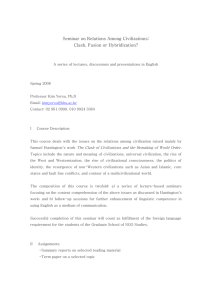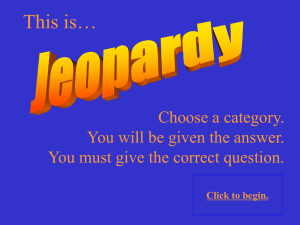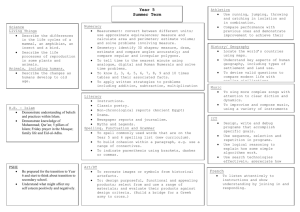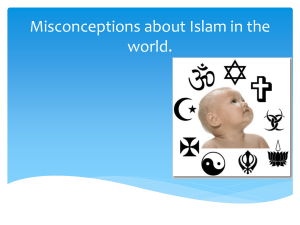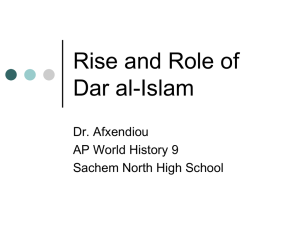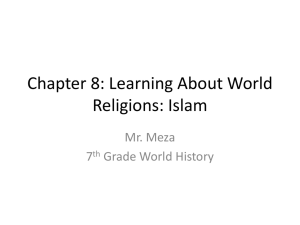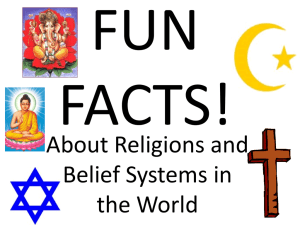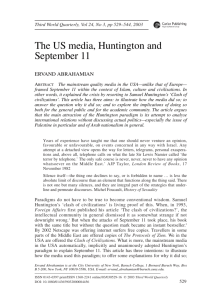The Clash of Ignorance
advertisement
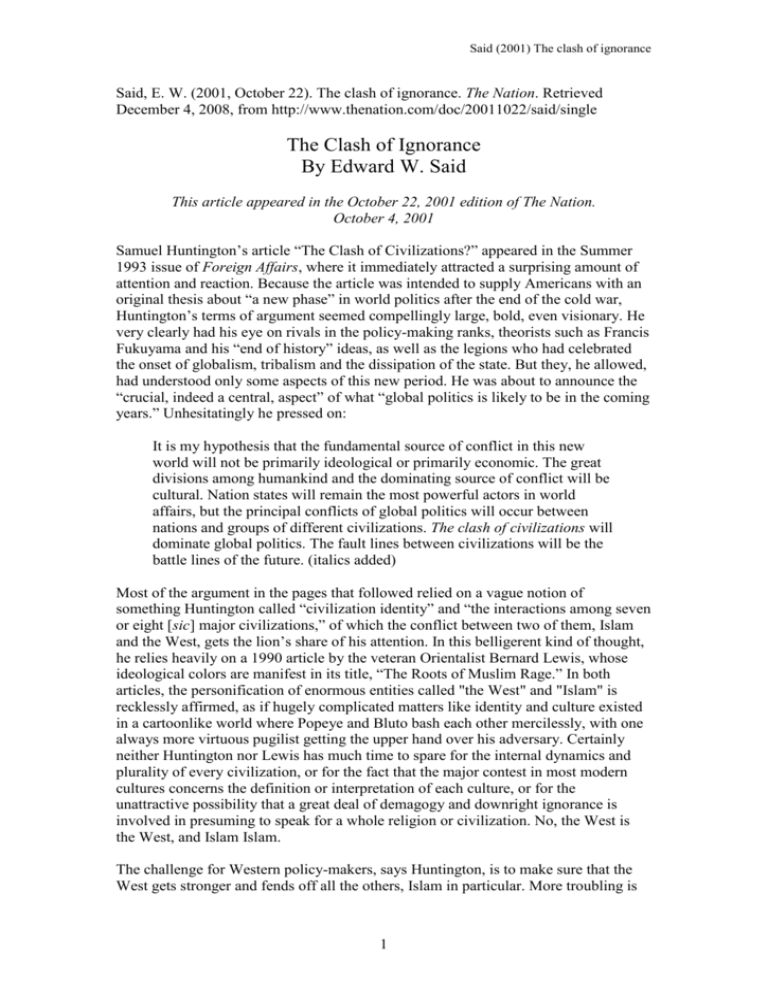
Said (2001) The clash of ignorance Said, E. W. (2001, October 22). The clash of ignorance. The Nation. Retrieved December 4, 2008, from http://www.thenation.com/doc/20011022/said/single The Clash of Ignorance By Edward W. Said This article appeared in the October 22, 2001 edition of The Nation. October 4, 2001 Samuel Huntington’s article “The Clash of Civilizations?” appeared in the Summer 1993 issue of Foreign Affairs, where it immediately attracted a surprising amount of attention and reaction. Because the article was intended to supply Americans with an original thesis about “a new phase” in world politics after the end of the cold war, Huntington’s terms of argument seemed compellingly large, bold, even visionary. He very clearly had his eye on rivals in the policy-making ranks, theorists such as Francis Fukuyama and his “end of history” ideas, as well as the legions who had celebrated the onset of globalism, tribalism and the dissipation of the state. But they, he allowed, had understood only some aspects of this new period. He was about to announce the “crucial, indeed a central, aspect” of what “global politics is likely to be in the coming years.” Unhesitatingly he pressed on: It is my hypothesis that the fundamental source of conflict in this new world will not be primarily ideological or primarily economic. The great divisions among humankind and the dominating source of conflict will be cultural. Nation states will remain the most powerful actors in world affairs, but the principal conflicts of global politics will occur between nations and groups of different civilizations. The clash of civilizations will dominate global politics. The fault lines between civilizations will be the battle lines of the future. (italics added) Most of the argument in the pages that followed relied on a vague notion of something Huntington called “civilization identity” and “the interactions among seven or eight [sic] major civilizations,” of which the conflict between two of them, Islam and the West, gets the lion’s share of his attention. In this belligerent kind of thought, he relies heavily on a 1990 article by the veteran Orientalist Bernard Lewis, whose ideological colors are manifest in its title, “The Roots of Muslim Rage.” In both articles, the personification of enormous entities called "the West" and "Islam" is recklessly affirmed, as if hugely complicated matters like identity and culture existed in a cartoonlike world where Popeye and Bluto bash each other mercilessly, with one always more virtuous pugilist getting the upper hand over his adversary. Certainly neither Huntington nor Lewis has much time to spare for the internal dynamics and plurality of every civilization, or for the fact that the major contest in most modern cultures concerns the definition or interpretation of each culture, or for the unattractive possibility that a great deal of demagogy and downright ignorance is involved in presuming to speak for a whole religion or civilization. No, the West is the West, and Islam Islam. The challenge for Western policy-makers, says Huntington, is to make sure that the West gets stronger and fends off all the others, Islam in particular. More troubling is 1 Said (2001) The clash of ignorance Huntington’s assumption that his perspective, which is to survey the entire world from a perch outside all ordinary attachments and hidden loyalties, is the correct one, as if everyone else were scurrying around looking for the answers that he has already found. In fact, Huntington is an ideologist, someone who wants to make “civilizations” and “identities” into what they are not: shut-down, sealed-off entities that have been purged of the myriad currents and countercurrents that animate human history, and that over centuries have made it possible for that history not only to contain wars of religion and imperial conquest but also to be one of exchange, crossfertilization and sharing. This far less visible history is ignored in the rush to highlight the ludicrously compressed and constricted warfare that “the clash of civilizations” argues is the reality. When he published his book by the same title in 1996, Huntington tried to give his argument a little more subtlety and many, many more footnotes; all he did, however, was confuse himself and demonstrate what a clumsy writer and inelegant thinker he was. The basic paradigm of West versus the rest (the cold war opposition reformulated) remained untouched, and this is what has persisted, often insidiously and implicitly, in discussion since the terrible events of September 11. The carefully planned and horrendous, pathologically motivated suicide attack and mass slaughter by a small group of deranged militants has been turned into proof of Huntington's thesis. Instead of seeing it for what it is—the capture of big ideas (I use the word loosely) by a tiny band of crazed fanatics for criminal purposes—international luminaries from former Pakistani Prime Minister Benazir Bhutto to Italian Prime Minister Silvio Berlusconi have pontificated about Islam's troubles, and in the latter's case have used Huntington’s ideas to rant on about the West's superiority, how “we” have Mozart and Michelangelo and they don’t. (Berlusconi has since made a halfhearted apology for his insult to “Islam.”) But why not instead see parallels, admittedly less spectacular in their destructiveness, for Osama bin Laden and his followers in cults like the Branch Davidians or the disciples of the Rev. Jim Jones at Guyana or the Japanese Aum Shinrikyo? Even the normally sober British weekly The Economist, in its issue of September 22-28, can't resist reaching for the vast generalization, praising Huntington extravagantly for his “cruel and sweeping, but nonetheless acute” observations about Islam. “Today,” the journal says with unseemly solemnity, Huntington writes that “the world’s billion or so Muslims are ‘convinced of the superiority of their culture, and obsessed with the inferiority of their power.’” Did he canvas 100 Indonesians, 200 Moroccans, 500 Egyptians and fifty Bosnians? Even if he did, what sort of sample is that? Uncountable are the editorials in every American and European newspaper and magazine of note adding to this vocabulary of gigantism and apocalypse, each use of which is plainly designed not to edify but to inflame the reader’s indignant passion as a member of the “West,” and what we need to do. Churchillian rhetoric is used inappropriately by self-appointed combatants in the West's, and especially America's, war against its haters, despoilers, destroyers, with scant attention to complex histories that defy such reductiveness and have seeped from one territory into another, in the process overriding the boundaries that are supposed to separate us all into divided armed camps. 2 Said (2001) The clash of ignorance This is the problem with unedifying labels like Islam and the West: They mislead and confuse the mind, which is trying to make sense of a disorderly reality that won't be pigeonholed or strapped down as easily as all that. I remember interrupting a man who, after a lecture I had given at a West Bank university in 1994, rose from the audience and started to attack my ideas as “Western,” as opposed to the strict Islamic ones he espoused. “Why are you wearing a suit and tie?” was the first retort that came to mind. “They’re Western, too.” He sat down with an embarrassed smile on his face, but I recalled the incident when information on the September 11 terrorists started to come in: how they had mastered all the technical details required to inflict their homicidal evil on the World Trade Center, the Pentagon and the aircraft they had commandeered. Where does one draw the line between “Western” technology and, as Berlusconi declared, “Islam’s” inability to be a part of “modernity”? One cannot easily do so, of course. How finally inadequate are the labels, generalizations and cultural assertions. At some level, for instance, primitive passions and sophisticated know-how converge in ways that give the lie to a fortified boundary not only between “West” and “Islam” but also between past and present, us and them, to say nothing of the very concepts of identity and nationality about which there is unending disagreement and debate. A unilateral decision made to draw lines in the sand, to undertake crusades, to oppose their evil with our good, to extirpate terrorism and, in Paul Wolfowitz’s nihilistic vocabulary, to end nations entirely, doesn’t make the supposed entities any easier to see; rather, it speaks to how much simpler it is to make bellicose statements for the purpose of mobilizing collective passions than to reflect, examine, sort out what it is we are dealing with in reality, the interconnectedness of innumerable lives, “ours” as well as “theirs.” In a remarkable series of three articles published between January and March 1999 in Dawn, Pakistan’s most respected weekly, the late Eqbal Ahmad, writing for a Muslim audience, analyzed what he called the roots of the religious right, coming down very harshly on the mutilations of Islam by absolutists and fanatical tyrants whose obsession with regulating personal behavior promotes “an Islamic order reduced to a penal code, stripped of its humanism, aesthetics, intellectual quests, and spiritual devotion.” And this “entails an absolute assertion of one, generally de-contextualized, aspect of religion and a total disregard of another. The phenomenon distorts religion, debases tradition, and twists the political process wherever it unfolds.” As a timely instance of this debasement, Ahmad proceeds first to present the rich, complex, pluralist meaning of the word jihad and then goes on to show that in the word's current confinement to indiscriminate war against presumed enemies, it is impossible “to recognize the Islamic--religion, society, culture, history or politics—as lived and experienced by Muslims through the ages.” The modern Islamists, Ahmad concludes, are “concerned with power, not with the soul; with the mobilization of people for political purposes rather than with sharing and alleviating their sufferings and aspirations. Theirs is a very limited and time-bound political agenda.” What has made matters worse is that similar distortions and zealotry occur in the “Jewish” and “Christian” universes of discourse. It was Conrad, more powerfully than any of his readers at the end of the nineteenth century could have imagined, who understood that the distinctions between civilized London and “the heart of darkness” quickly collapsed in extreme situations, and that the heights of European civilization could instantaneously fall into the most barbarous 3 Said (2001) The clash of ignorance practices without preparation or transition. And it was Conrad also, in The Secret Agent (1907), who described terrorism’s affinity for abstractions like “pure science” (and by extension for “Islam” or “the West”), as well as the terrorist's ultimate moral degradation. For there are closer ties between apparently warring civilizations than most of us would like to believe; both Freud and Nietzsche showed how the traffic across carefully maintained, even policed boundaries moves with often terrifying ease. But then such fluid ideas, full of ambiguity and skepticism about notions that we hold on to, scarcely furnish us with suitable, practical guidelines for situations such as the one we face now. Hence the altogether more reassuring battle orders (a crusade, good versus evil, freedom against fear, etc.) drawn out of Huntington’s alleged opposition between Islam and the West, from which official discourse drew its vocabulary in the first days after the September 11 attacks. There’s since been a noticeable deescalation in that discourse, but to judge from the steady amount of hate speech and actions, plus reports of law enforcement efforts directed against Arabs, Muslims and Indians all over the country, the paradigm stays on. One further reason for its persistence is the increased presence of Muslims all over Europe and the United States. Think of the populations today of France, Italy, Germany, Spain, Britain, America, even Sweden, and you must concede that Islam is no longer on the fringes of the West but at its center. But what is so threatening about that presence? Buried in the collective culture are memories of the first great ArabIslamic conquests, which began in the seventh century and which, as the celebrated Belgian historian Henri Pirenne wrote in his landmark book Mohammed and Charlemagne (1939), shattered once and for all the ancient unity of the Mediterranean, destroyed the Christian-Roman synthesis and gave rise to a new civilization dominated by northern powers (Germany and Carolingian France) whose mission, he seemed to be saying, is to resume defense of the “West” against its historical-cultural enemies. What Pirenne left out, alas, is that in the creation of this new line of defense the West drew on the humanism, science, philosophy, sociology and historiography of Islam, which had already interposed itself between Charlemagne’s world and classical antiquity. Islam is inside from the start, as even Dante, great enemy of Mohammed, had to concede when he placed the Prophet at the very heart of his Inferno. Then there is the persisting legacy of monotheism itself, the Abrahamic religions, as Louis Massignon aptly called them. Beginning with Judaism and Christianity, each is a successor haunted by what came before; for Muslims, Islam fulfills and ends the line of prophecy. There is still no decent history or demystification of the many-sided contest among these three followers--not one of them by any means a monolithic, unified camp—of the most jealous of all gods, even though the bloody modern convergence on Palestine furnishes a rich secular instance of what has been so tragically irreconcilable about them. Not surprisingly, then, Muslims and Christians speak readily of crusades and jihads, both of them eliding the Judaic presence with often sublime insouciance. Such an agenda, says Eqbal Ahmad, is “very reassuring to the men and women who are stranded in the middle of the ford, between the deep waters of tradition and modernity.” But we are all swimming in those waters, Westerners and Muslims and others alike. And since the waters are part of the ocean of history, trying to plow or divide them 4 Said (2001) The clash of ignorance with barriers is futile. These are tense times, but it is better to think in terms of powerful and powerless communities, the secular politics of reason and ignorance, and universal principles of justice and injustice, than to wander off in search of vast abstractions that may give momentary satisfaction but little self-knowledge or informed analysis. “The Clash of Civilizations” thesis is a gimmick like “The War of the Worlds,” better for reinforcing defensive self-pride than for critical understanding of the bewildering interdependence of our time. 5
